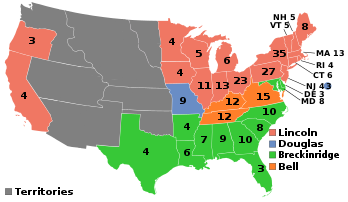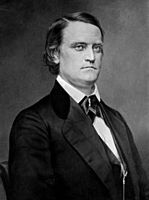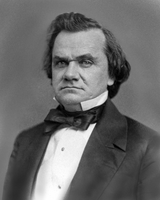
Back انتخابات الرئاسة الأمريكية 1860 Arabic Præsidentvalget i USA 1860 Danish Präsidentschaftswahl in den Vereinigten Staaten 1860 German Elecciones presidenciales de Estados Unidos de 1860 Spanish انتخابات ریاستجمهوری ایالات متحده آمریکا (۱۸۶۰) Persian Yhdysvaltain presidentinvaalit 1860 Finnish Élection présidentielle américaine de 1860 French הבחירות לנשיאות ארצות הברית 1860 HE Elezioni presidenziali negli Stati Uniti d'America del 1860 Italian 1860年アメリカ合衆国大統領選挙 Japanese
| ||||||||||||||||||||||||||||||||||||||||||||||||||||||||||||||||
303 members of the Electoral College 152 electoral votes needed to win | ||||||||||||||||||||||||||||||||||||||||||||||||||||||||||||||||
|---|---|---|---|---|---|---|---|---|---|---|---|---|---|---|---|---|---|---|---|---|---|---|---|---|---|---|---|---|---|---|---|---|---|---|---|---|---|---|---|---|---|---|---|---|---|---|---|---|---|---|---|---|---|---|---|---|---|---|---|---|---|---|---|---|
| Turnout | 81.8%[1] | |||||||||||||||||||||||||||||||||||||||||||||||||||||||||||||||
| ||||||||||||||||||||||||||||||||||||||||||||||||||||||||||||||||
 Presidential Election results map. Red denotes states won by Lincoln/Hamlin, green by Breckinridge/Lane, orange by Bell/Everett, and blue by Douglas/Johnson. Numbers indicate electoral votes cast by each state. | ||||||||||||||||||||||||||||||||||||||||||||||||||||||||||||||||
| ||||||||||||||||||||||||||||||||||||||||||||||||||||||||||||||||
The 1860 United States presidential election was the 19th quadrennial presidential election, held on Tuesday, November 6, 1860. In a four-way contest, the Republican Party ticket of Abraham Lincoln and Hannibal Hamlin[2] won a national popular plurality, a popular majority in the North where states already had abolished slavery, and a national electoral majority comprising only Northern electoral votes. Lincoln's election thus served as the main catalyst of the states that would become the Confederacy seceding from the Union. This marked the first time that a Republican was elected president. It was also the first presidential election in which both major party candidates were registered in the same home state; the others have been in 1904, 1920, 1940, 1944, and 2016.
The United States had become increasingly sectionally divided during the 1850s, primarily over extending slavery into the western territories. The incumbent president, James Buchanan, like his predecessor, Franklin Pierce, was a Northern Democrat with Southern sympathies. Buchanan also adamantly promised not to seek re-election. From the mid-1850s, the anti-slavery Republican Party became a major political force, driven by Northern voter opposition to the Kansas–Nebraska Act and the Supreme Court's 1857 decision in Dred Scott v. Sandford. From the election of 1856, the Republican Party had replaced the defunct Whig Party as the major opposition to the Democrats. A group of former Whigs and Know Nothings formed the Constitutional Union Party, which sought to avoid disunion by resolving divisions over slavery with some new compromise.
The 1860 Republican National Convention in Chicago nominated Abraham Lincoln, a moderate former one-term Whig Representative from Illinois. Its platform promised not to interfere with slavery in the South but opposed extension of slavery into the territories. The 1860 Democratic National Convention adjourned in Charleston, South Carolina, without agreeing on a nominee, but a second convention in Baltimore, Maryland, nominated Illinois Senator Stephen A. Douglas. Douglas's support for the concept of popular sovereignty, which called for each territory's settlers to decide locally on the status of slavery, alienated many radical pro-slavery Southern Democrats, who wanted the territories, and perhaps other lands, open to slavery. With President Buchanan's support, Southern Democrats held their own convention, nominating Vice President John C. Breckinridge of Kentucky. The 1860 Constitutional Union Convention, which hoped to avoid the slavery issue entirely, nominated a ticket led by former Tennessee Senator John Bell.
Lincoln's main opponent in the North was Douglas, who won the popular vote in Missouri, electoral votes in New Jersey, and the second highest popular vote total nationally. Douglas was the only candidate in the 1860 election to win electoral votes in both free and slave states. In the South, Bell won three states and Breckinridge swept the remaining 11. Lincoln's election motivated seven Southern states, all voting for Breckinridge, to secede before the inauguration in March. The American Civil War began less than two months after Lincoln's inauguration, with the Battle of Fort Sumter; afterwards four further states seceded. Lincoln would go on to win re-election in the 1864 United States presidential election. The election was the first of six consecutive Republican victories. Despite Lincoln's commanding victory, this was the first election in American history in which the winner has failed to win his home county, with Lincoln narrowly losing Sangamon County, Illinois to Douglas. However, he would win Gasconade County, Missouri, which as of the 2020 United States presidential election, has voted Republican ever since, marking the beginning of the longest active voting streak for any party at the county level.
- ^ "National General Election VEP Turnout Rates, 1789-Present". United States Election Project. CQ Press.
- ^ Burlingame, Michael (October 4, 2016). "Abraham Lincoln: Campaign and Elections". Archived from the original on April 2, 2017. Retrieved July 13, 2021.
Cite error: There are <ref group=nb> tags on this page, but the references will not show without a {{reflist|group=nb}} template (see the help page).
© MMXXIII Rich X Search. We shall prevail. All rights reserved. Rich X Search



